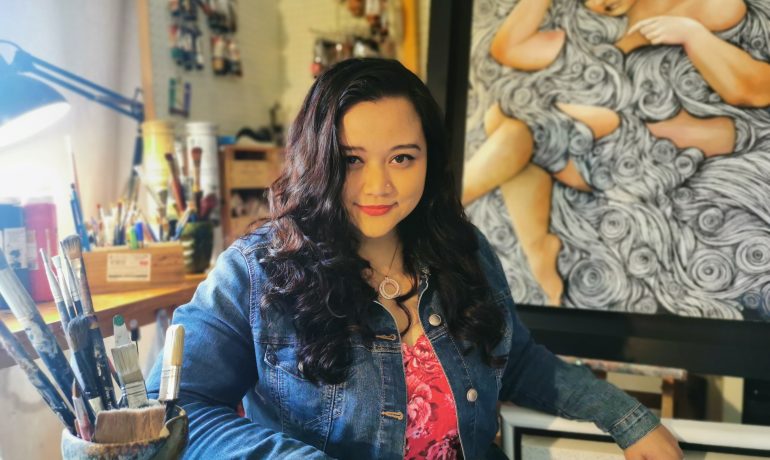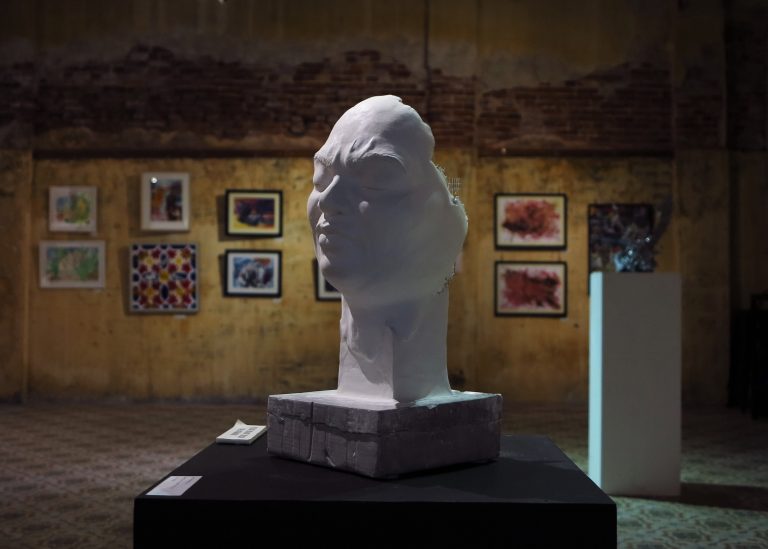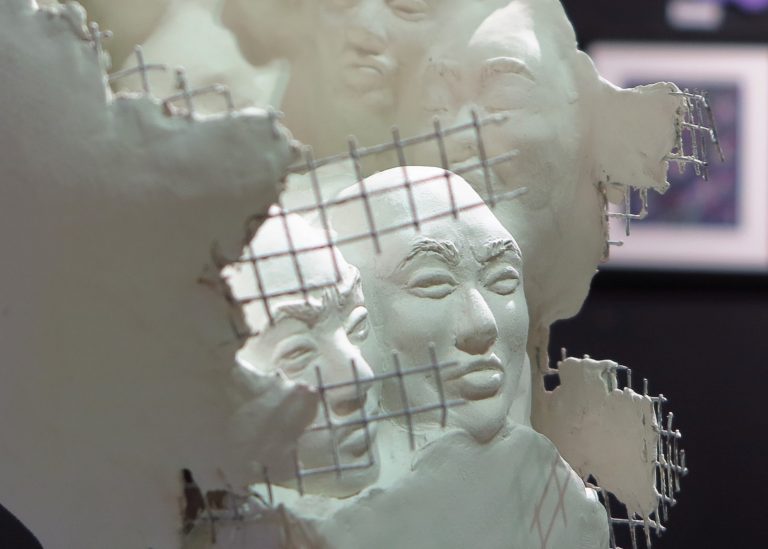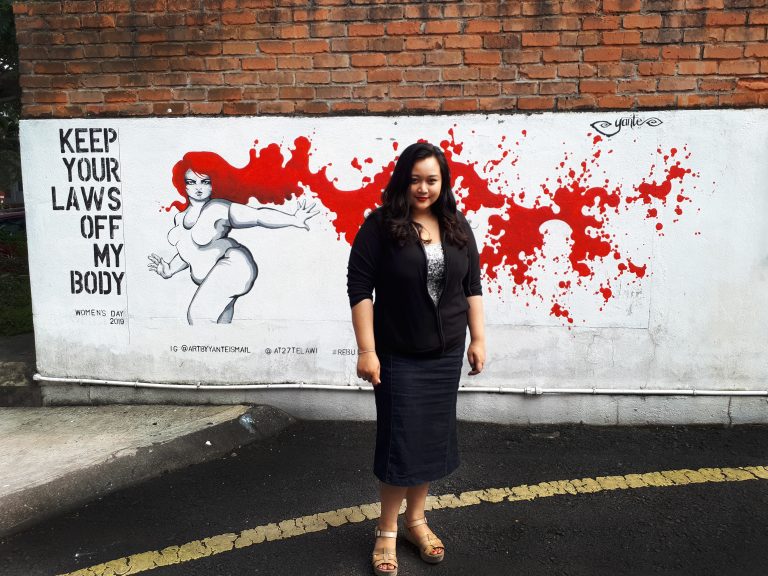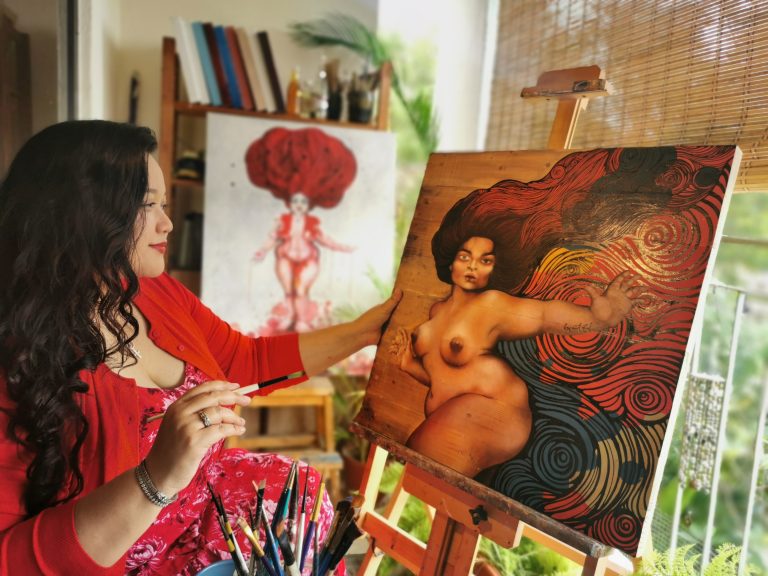Seeing patriarchy as the root of social injustice, Yante Ismail fights against it through her bold nude women paintings and emotionally-nuanced sculptures.
By Lee Kwai Han
A head sculpture sits in the middle of the Hin Bus Depot Gallery, eyes closed and frowning. She seems to be deep in thought, paying no attention to the different shapes and colours around her.
This is Seen but Unseen IV, Yante Ismail’s latest addition to the Seen but Unseen sculpture series.
Seen But Unseen IV, 2023, mixed media sculpture in Kecik-kecik Group Show which runs from 3rd to 12th March 2023 in Hin Bus Depot. Yante depicts how women are impacted disproportionally by the Covid-19 pandemic through the Seen But Unseen series. Photo: Lee Kwai Han.
Believing and Acting on Feminism
Since young, Yante has been exposed to different art mediums, such as painting, carving and sculpting with paper clay. She had always wondered what can art do until she visited an art gallery in Seattle in her early twenties. There, she finally found an answer: to influence social change through art.
Read more: The Art of Change
Besides sculpting, Yante has also been painting to empower women using oil, acrylic, and watercolour for 15 years. She thinks the budding of her feminism was deeply influenced by her mother, through conversations and observing how her mother herself was independent and strong since young.
After graduating from Universiti Sains Malaysia, she has been working with international humanitarian organisations. Until today, she continues to view issues she works on through a gender lens.
The other side of Seen But Unseen IV reveals the multitude of pain and anger women went through, hidden behind the walls of confinement, during the Covid-19 pandemic. In addition to emotional stress, UN Women reported that “violence against women and girls has intensified since the outbreak of Covid-19.” It is coined the “shadow pandemic”. Photo: Lee Kwai Han.
Yante observes that gender inequity remains in workplaces, families, and society, even when women are now educated and empowered economically. She sees the need to tackle the root cause of inequity: patriarchy.
“Because until you dismantle patriarchy and all the systems associated with patriarchy,” she says, “you’ll never truly achieve a situation of equity for women and men. Men are affected by patriarchy as well; women can also be the power within the patriarchy. But what’s clear is we are all victims of patriarchy.”
Yante thinks women re-claiming the ownership of their bodies is a crucial act in this battle. “We will never be fully free for as long as our bodies aren’t our own.”
Keep Your Laws Off My Body, 2019, acrylic on wall. “Every day, and especially on International Women’s Day, I am saying, women have had enough. We are saying, ‘my body, my choice’,” says Yante.
Photo courtesy of Yante Ismail.
Shifting Narratives
In 2019, Yante painted Keep Your Laws Off My Body on the exterior wall of @27Telawi gallery in Bangsar for International Women’s Day. “I wasn’t talking about legislation in particular. I was talking more about human law, societal law, religious law, and cultural law, which feel like they have a right to dictate how a woman behaves in her body, how a woman looks in her body and how the body is being used.”
Other than that, she also paints her women nude. She calls for society to see a female body simply biologically, without cultural bias, and more importantly outside the trap of the male gaze. “Patriarchy or cultural, social, and religious norms have taught women to watch themselves. Even in the absence of the male gaze, women are still watching themselves,” says Yante, referring to Michel Foucault’s panopticism.
Yante Ismail challenges social, religious and cultural norms through her painting of nude women.
Photo courtesy of Yante Ismail.
For Yante, to fight against patriarchy requires the lens to scrutinise influences behind one’s decisions and actions, even their own. “When I put on lipstick, why am I doing that? Am I doing that because society has taught me that you’re prettier when you put on lipstick or is it because I feel prettier? And even [if] I feel prettier, why? Who taught me to feel prettier because I put on lipstick?”
Affecting Change while Facing Disparity in the Art World
While Yante speaks to the world about women’s rights through her art, the art world itself is not spared from gender disparity. A study on the effect of the artist’s gender on art prices observes that “respondents who are men, affluent respondents, and respondents who often visit art galleries appreciate paintings less whose artists they perceive to be female”.
Despite that, Yante thinks female artists should consciously support each other in navigating the art world. She has been enjoying friendship and support from other female artists, as well as learning from them.
From our archives: Celebrating Malaysian women in arts – Penang Art District
When asked what change she wishes her art could bring, she says, “I always try to think about the young girl who needs to see a representation that she identifies with.” For her, change is not limited to any biological age:
“They may be 50-year-old women…If my art and my writing give her language for her to express what she’s feeling, if my art gives her the courage to look at an issue in a different way, to speak about it in a different way, to me, that’s the change that I want.”
Cover photo courtesy of Yante Ismail.
Lee Kwai Han manages arts and environmental education projects in Penang. Despite her training in engineering, she believes arts is the software solution our society needs.

